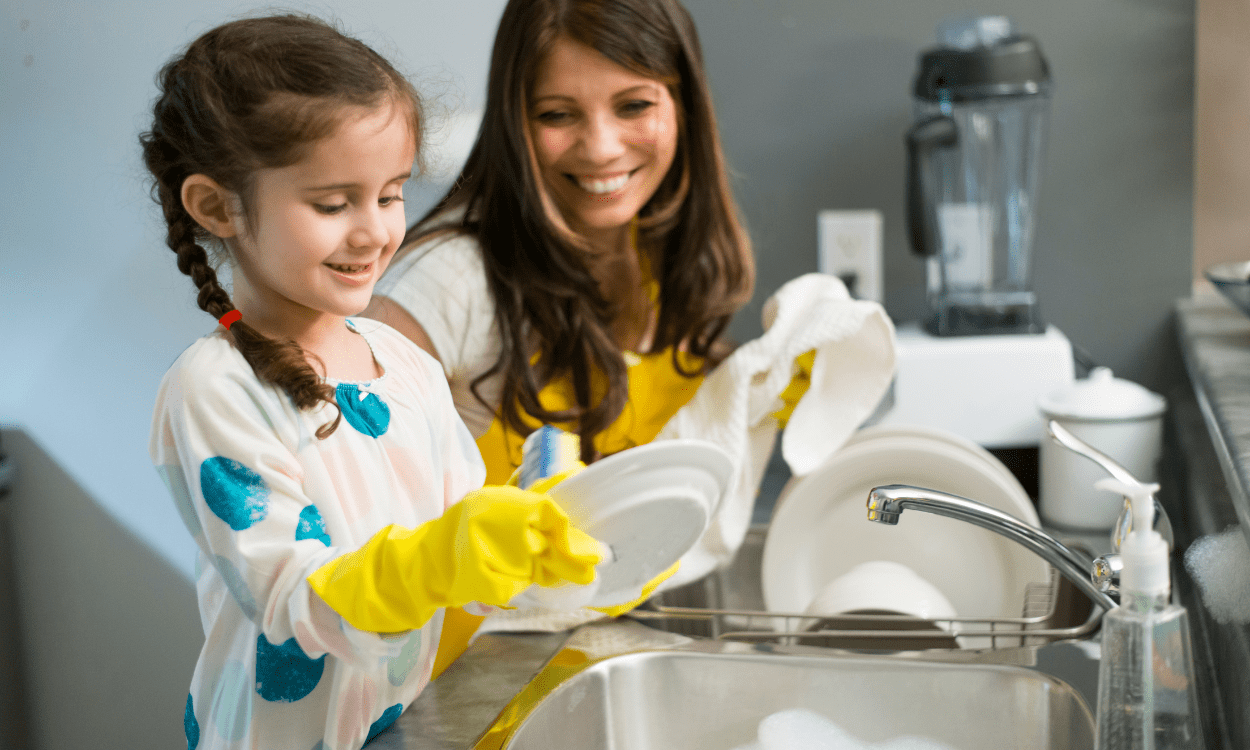It’s very common to see toddlers, aged 2-3 years, displaying a strong desire to do things independently, and you can play a big part in nurturing that independence with practical life activities.
Practical life activities help your child understand the culture they come from and the expectations of that culture. Today, we’ll be discussing the four areas of practical life development – grace and courtesy, fundamental skills, care of the self, care of the environment, and control of movement – and how each of these types of activities can promote independence and a sense of belonging in your child. Let’s get started!
Grace and courtesy
Firstly, grace and courtesy activities introduce children to cultural behaviors, expectations, and etiquette. Saying “please” and “thank you” when they want something, taking care when walking to not disrupt other kids, and waiting patiently for their turn are all essential etiquette to internalize so your child can independently handle themselves around other children and grownups. Children have an amazing ability to mimic what they see and hear, so the best place to start their etiquette lessons is in your own home.
This baseline respect for others helps your child navigate new and existing social relationships with consideration for other people, which is essential for helping your child to participate in society in a respectful way all on their own!
Fundamental skills and control of movement
Secondly, fundamental skills such as order, coordination, independence, and concentration are honed through practical life activities. As the name implies, these skills are foundational to developing your child’s capacity to independently learn and understand more complex concepts in the coming years. Children learn the importance of organization and consistency in tasks, as well as develop their motor skills and cultivate the ability to concentrate.
These fundamental skills tie directly into control of movement. Control of movement activities focus on refining children’s physical coordination and self-discipline. Practical life activities like walking on a line or practicing patience while transferring water with a sponge can help children gain control over their bodies and movements. By developing discipline and order in their actions, children progress towards what Maria Montessori called “normalization,” a state of balanced and harmonious development.
To help your child internalize these skillsets, you can provide a structured environment that rewards consistent attempts to organize and to develop their motor skills. This is most easily accomplished with a personalized education with Inspire Kids Montessori. Our experienced Montessori teachers will give your child the structure they need to thrive while still giving them the space to be their own person. Contact us today for a free tour of our facilities!
Care of self
Care of self activities empower children to take responsibility for their personal needs. From putting on shoes and jackets to washing hands to brushing teeth, these tasks instill a sense of pride and ownership in being self-sufficient. By learning how to care for themselves, children develop a strong sense of autonomy and self-reliance.
To quote Professor Maria Montessori herself, “Never help a child with a task at which he feels he can succeed.” The best way to help your child practice self-care is to give them the tools and the know-how to do so until they show interest in doing the activities themselves. If your child wants to try putting their shoes on independently, you should give them the time they need to try and self-correct as necessary.
Care of environment
Care of the environment activities teach children to respect and care for their surroundings, such as their living space and natural spaces they enter. Simple tasks such as sweeping crumbs, opening doors, rolling up play mats, or picking up litter not only contribute to the tidiness of the environment but also cultivate a sense of responsibility towards their surroundings.
It’s through this sense of responsibility that your child can internalize this care and understand its inherent goodness for themselves and those around them. Plus, it helps your child understand the care that goes into cleaning up messes that they create, which over time can help them avoid making big messes unnecessarily.
Choose a practical life education today!
Inspire Kids Montessori is ready to support and reinforce your at-home practical life activities with a personalized Montessori education. Our Montessori programs have a holistic approach to child development, promoting social, physical, and academic growth in conjunction. Together, let’s inspire your child’s journey towards independence and unlock their full potential! Reach out to learn more about our primary (2-3 year old) class openings!

